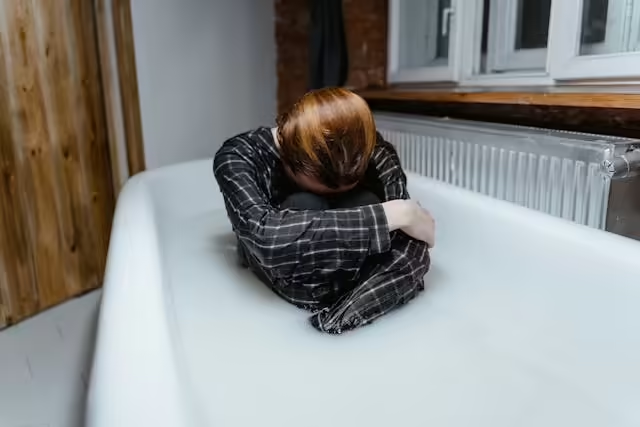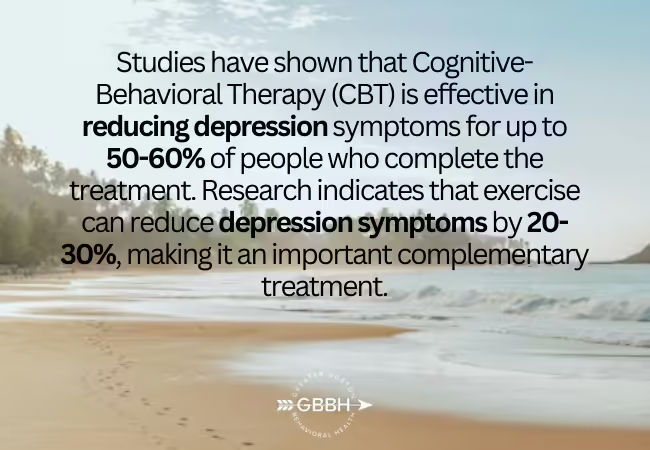Depression is a common but serious mental health condition that affects millions of people nationwide. While medications are often prescribed to help manage symptoms, there are many who prefer or require drug-free alternatives. At Greater Boston Behavioral Health, we are committed to helping individuals find comprehensive and effective treatment solutions that prioritize their overall well-being. If you’re seeking ways to manage depression without drugs, understanding the best practices and therapeutic approaches available is the first step toward a healthier, happier life.
Understanding Depression
Depression is not simply feeling sad or going through a rough patch. It is a clinical condition that can impact your thoughts, feelings, behavior, and overall physical health. Depression may manifest as persistent sadness, irritability, hopelessness, fatigue, difficulty concentrating, changes in appetite and sleep patterns, and even thoughts of death or suicide. The condition can be triggered by various factors, including genetics, traumatic experiences, chronic stress, and chemical imbalances in the brain.
Even though depression can be complex and challenging, managing it without the use of medication is possible through various holistic and therapeutic methods. Choosing non-drug treatments often depends on the severity of symptoms and the individual’s unique needs, but evidence-based strategies have been proven to help improve emotional health and quality of life.
Effective Strategies for Managing Depression Without Medication
- Cognitive-Behavioral Therapy (CBT)
Cognitive-Behavioral Therapy (CBT) is one of the most effective approaches for managing depression without medication. CBT is a structured, time-limited therapy that focuses on identifying and changing unhelpful thought patterns and behaviors. Through CBT, individuals learn how to recognize negative thinking and reframe their responses to situations in a healthier way. This can lead to reduced depressive symptoms and a better ability to handle stressors.
CBT helps patients develop practical skills that empower them to cope with stress, regulate their emotions, and replace self-defeating thoughts with more positive and realistic ones. Research has shown that CBT is as effective as antidepressant medication for many individuals, making it an excellent first-line treatment for those who prefer a non-drug approach.
- Dialectical Behavior Therapy (DBT)
Dialectical Behavior Therapy (DBT) is another form of therapy that can be particularly beneficial for those dealing with depression, especially if they struggle with emotional regulation. DBT, originally developed for borderline personality disorder, has proven to be effective in treating other mood disorders, including depression.
DBT helps individuals understand and accept their emotions while also teaching them practical skills for managing stress, building healthy relationships, and improving mindfulness. Through four main components—mindfulness, distress tolerance, emotional regulation, and interpersonal effectiveness—DBT provides the foundation for better emotional control and improved quality of life.
- Exercise and Physical Activity
Physical activity can have a profound and immediate effect on mood and mental health. Exercise releases endorphins, the body’s natural mood elevators, and has been linked to reduced levels of depression. Regular physical activity can also help combat fatigue, improve sleep, and increase energy levels, which are often negatively affected by depression. Whether it’s a brisk walk, a cycling session, yoga, or a full gym workout, finding an activity you enjoy and committing to it regularly can be a powerful tool for managing depression without drugs.
For individuals with mild to moderate symptoms, at least 30 minutes of moderate-intensity exercise most days of the week can make a significant difference. Additionally, incorporating activities such as stretching or yoga can improve relaxation, reduce muscle tension, and promote a sense of calm.
- Mindfulness and Meditation
Mindfulness and meditation practices help individuals remain present and reduce the tendency to ruminate on negative thoughts or anticipate future stressors. By practicing mindfulness, you can learn to observe your thoughts without judgment, which can lead to a reduction in negative thinking patterns and emotional distress.
Mindfulness-based interventions have been found to decrease symptoms of depression by enhancing emotional awareness and acceptance. These practices can be as simple as focusing on your breath for a few minutes or following guided meditation apps that walk you through exercises designed to bring awareness to the present moment.
- Building a Support Network
Having a strong network of friends, family, or community groups can be essential in managing depression. Social isolation can exacerbate symptoms and make it difficult to navigate challenges. On the other hand, building and maintaining connections with supportive people provides validation, comfort, and practical assistance when needed.
Support groups are a great option for people who want to share experiences and strategies with others facing similar challenges. Whether in-person or online, support groups can offer a sense of belonging and shared understanding that can alleviate feelings of loneliness and isolation.
- Healthy Lifestyle Choices
Lifestyle modifications can also significantly impact depression symptoms. Eating a balanced diet that includes plenty of fruits, vegetables, lean proteins, and whole grains can help regulate your mood and energy levels. Proper hydration and limiting alcohol and caffeine can further contribute to overall mental and physical well-being.
Sleep hygiene is another important aspect to consider. Poor sleep or disrupted sleep patterns can worsen depression, so creating a sleep schedule and maintaining a calming bedtime routine can greatly improve sleep quality. If you struggle with insomnia, consider relaxation techniques such as deep breathing or progressive muscle relaxation before bed.
The Science Behind Depression and Non-Pharmacological Treatments
Depression is a complex mental health condition that impacts mood, behavior, and overall well-being. It is often linked to imbalances in neurotransmitters, such as serotonin, dopamine, and norepinephrine, which affect how we process emotions. Non-pharmacological treatments target these imbalances through behavioral, psychological, and lifestyle interventions that promote natural regulation of mood and thought processes. By engaging in therapies and practices that enhance brain function and emotional resilience, individuals can alleviate symptoms of depression and build a more sustainable approach to mental health.
Cognitive-Behavioral Therapy (CBT) for Depression
Cognitive-Behavioral Therapy (CBT) is one of the most effective, evidence-based treatments for depression. It works by helping individuals identify and challenge negative thought patterns and beliefs, replacing them with healthier, more constructive ways of thinking. CBT involves structured sessions with a trained therapist who guides the patient through exercises to recognize triggers, reframe negative thoughts, and develop problem-solving skills. This form of therapy empowers people to take control of their emotional responses, leading to lasting changes in behavior and mood. It is often combined with other strategies, such as mindfulness practices, to enhance its effectiveness.
Dialectical Behavior Therapy (DBT) and Emotional Regulation
Dialectical Behavior Therapy (DBT), initially developed for borderline personality disorder, has proven beneficial for managing depression and emotional dysregulation. DBT combines principles of cognitive-behavioral therapy with mindfulness, distress tolerance, emotional regulation, and interpersonal effectiveness. The core goal of DBT is to help individuals accept their current emotional state while working on changing unhelpful patterns of behavior. This is particularly helpful for those who experience extreme emotional responses or struggle to manage their emotions effectively. Techniques such as mindfulness meditation and emotion-tracking exercises can provide significant relief and prevent depressive episodes from worsening.
Incorporating Exercise and Physical Activity
Physical activity is a powerful tool in managing depression, not just for its physical benefits but also for its positive impact on mental health. Regular exercise boosts endorphin levels, which can naturally improve mood and reduce feelings of sadness. Activities like walking, running, cycling, or yoga promote the release of serotonin and dopamine, which help regulate mood. Even 20 to 30 minutes of moderate exercise several times a week can help combat depressive symptoms. Starting small and setting achievable goals can make the process less daunting for those with low energy levels or motivation. Additionally, group activities or exercise classes can provide social interaction, which is another positive factor in fighting depression.
Practical Tips for Maintaining Progress
Maintaining progress after engaging in non-pharmacological treatments for depression can be challenging but is essential for long-term well-being. Here are some practical strategies:
- Set Realistic Goals: Break down larger tasks into smaller, manageable steps to avoid feeling overwhelmed and maintain a sense of accomplishment.
- Stay Connected: Regular interaction with friends, family, or support groups can foster a sense of community and belonging.
- Practice Mindfulness: Regular mindfulness exercises can help you stay present and avoid ruminating on negative thoughts.
- Keep a Journal: Writing about daily experiences and feelings can help you track progress and reflect on positive changes.
- Prioritize Self-Care: Ensuring adequate sleep, a balanced diet, and relaxation time supports overall mental health.
- Be Patient with Yourself: Depression recovery is not linear, and it’s important to recognize that setbacks are a natural part of the process. Seek support when needed and remind yourself that healing takes time.
When to Seek Professional Help
While self-care strategies are effective for many people, there are times when professional support is essential. If your symptoms persist, worsen, or interfere with your ability to function daily, it’s important to reach out to a mental health professional. At Greater Boston Behavioral Health, we offer a range of mental health therapy programs that provide comprehensive, personalized treatment plans to support you on your journey to mental wellness.
Our programs include Cognitive-Behavioral Therapy (CBT) and Dialectical Behavior Therapy (DBT), which can be combined with our intensive outpatient programs (IOP) and partial hospitalization programs (PHP) to create a comprehensive, effective treatment plan. Whether you’re looking for individual therapy or group support, our team is here to help you manage depression and improve your quality of life without the use of medication.
Conclusion
Managing depression without drugs is a realistic and beneficial option for many individuals. Through evidence-based therapies such as CBT and DBT, regular exercise, mindfulness practices, and building a supportive social network, you can take control of your mental health and work toward a more balanced, fulfilling life. At Greater Boston Behavioral Health, we are dedicated to providing the best mental health treatment programs to help you navigate your journey toward better mental health. Call us at (888)278-0716 today to learn more about our services and how we can help you on your journey to recovery!
FAQs on How to Manage Depression Without Drugs
What are non-pharmacological treatments for depression?
Non-pharmacological treatments for depression include therapies like Cognitive-Behavioral Therapy (CBT) and Dialectical Behavior Therapy (DBT), along with lifestyle changes such as regular exercise, mindfulness, and building a support network.
How does Cognitive-Behavioral Therapy (CBT) help with depression?
CBT helps by identifying and changing negative thought patterns, enabling individuals to respond to challenges in a healthier way and develop problem-solving skills that reduce depressive symptoms.
What is Dialectical Behavior Therapy (DBT) and how does it support emotional regulation?
DBT is a therapeutic approach that combines cognitive-behavioral techniques with mindfulness. It helps individuals manage intense emotions, improve interpersonal relationships, and accept their current emotional state while learning to regulate it.
How does physical activity contribute to managing depression?
Exercise boosts endorphin levels, leading to improved mood and decreased depressive symptoms. Activities like walking, cycling, or yoga also help regulate serotonin and dopamine levels, which play a critical role in emotional health.
What are some practical tips for maintaining progress in depression management?
Tips include setting realistic goals, staying connected with loved ones, practicing mindfulness, keeping a journal, prioritizing self-care, and being patient with yourself during the recovery process.
When should I seek professional help for depression?
If your depressive symptoms persist despite trying non-pharmacological approaches or become severe, it is important to seek professional help from a Mental Health Treatment Center. Treatment programs, such as Intensive Outpatient Programs (IOP) or Partial Hospitalization Programs (PHP), offer structured support for managing depression effectively.


